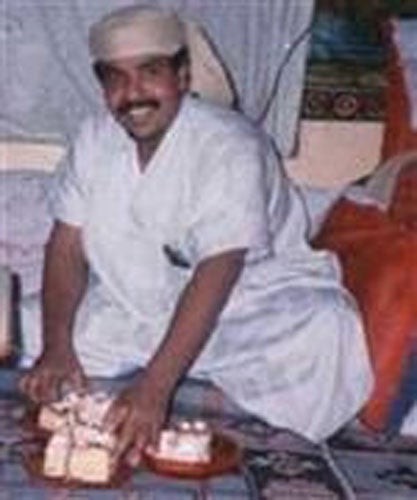Outrage as US military convicts Bin Laden's driver of war crimes

Your support helps us to tell the story
From reproductive rights to climate change to Big Tech, The Independent is on the ground when the story is developing. Whether it's investigating the financials of Elon Musk's pro-Trump PAC or producing our latest documentary, 'The A Word', which shines a light on the American women fighting for reproductive rights, we know how important it is to parse out the facts from the messaging.
At such a critical moment in US history, we need reporters on the ground. Your donation allows us to keep sending journalists to speak to both sides of the story.
The Independent is trusted by Americans across the entire political spectrum. And unlike many other quality news outlets, we choose not to lock Americans out of our reporting and analysis with paywalls. We believe quality journalism should be available to everyone, paid for by those who can afford it.
Your support makes all the difference.A jury of six military officers yesterday delivered a split verdict in the trial at Guantanamo Bay of a former driver of Osama bin Laden, convicting him of providing material support for terrorism but finding him innocent of potentially more serious allegations.
The conviction, which brought to a conclusion the first war crimes trial involving the United States since the Second World War, drew instant protests from critics of the military system of trials put in place in Guantanamo, but was a qualified success for the administration of President George Bush.
The defendant, Salim Ahmed Hamdan, reportedly wept as the judge read the verdicts in a courthouse on a hilltop in the Guantanamo complex. Under the rules of the military commission, determined by the Pentagon, no members of the public were allowed to witness the proceedings.
Other differences between trials on the mainland and the commission system have fuelled the controversy over whether inmates at Guantanamo are being deprived of justice. In these trials, legal documents are mostly not released, hearsay evidence is permitted and confessions may even be elicited under physical coercion.
Hamdan, who is from Yemen, was taken into custody at a road block in Afghanistan in November 2001 and moved to Guantanamo as an enemy combatant soon afterwards. Military prosecutors said he helped Bin Laden evade capture and detection by driving him around after al-Qa'ida attacks on the US, including the bombing of US embassies in Africa and the 11 September 2001 suicide attacks on the World Trade Centre in New York.
The prosecutors failed to convince the jury that Hamdan's service to the al-Qa'ida leader amounted to participating in conspiracies against the US. However, his conviction on the lesser charge could still entail life imprisonment. The judge scheduled a sentencing hearing for later yesterday.
Among the groups protesting against the verdict last night was the British-based legal charity Reprieve. "These trials are not just about a few men and what they may have done – they are about the message the United States is sending to the world. And that message right now is flat wrong: convictions by any means necessary," said Reprieve's senior counsel Zachary Katznelson. "The US needs to show it stands for openness and fairness – the very values we are fighting for. Instead, we get verdicts rammed down the gullet of justice."
The conviction also drew scorn from Ben Wizner, of the American Civil Liberties Union, who was allowed at the trial. "We were told that Guantanamo was necessary because these were the world's most dangerous terrorists," he said. "Salim Hamdan is not one of the world's most dangerous terrorists."
That the first Guantanamo conviction should involve a driver might seem oddly anticlimactic. But the successful conclusion of the Hamdan trial clears the way for the Pentagon to push forward with the trials of up to 80 other detainees, many believed to have played more pivotal roles in the 9/11 attacks. "We're pleased that Salim Hamdan received a fair trial," said the White House spokesman Tony Fratto. "The military commission system is a fair and appropriate legal process for prosecuting detainees alleged to have committed crimes against the United States or our interests. We look forward to other cases moving forward to trial."
But the military lawyers for Hamdan, who is believed to be around 40, indicated that they would seek redress from mainland courts of appeal. In one of a series of setbacks for the Pentagon, the US Supreme Court ruled in June that inmates at Guantanamo have a constitutional right to challenge their detentions in a federal court. Lt-Cdr Charles Swift, who was defending Hamdan, said the commission system was "made up to try anybody we don't like".
Amnesty International also criticised the commission system last night. In a statement shortly after the reading of the Hamdan verdicts, it said the military courts at Guantanamo were "fundamentally flawed and that the tribunals should be abandoned in all cases".
Witnesses called to testify against Hamdan included American agents who had been involved in his original interrogation. Among them was the FBI agent George Crouch. He told the military court: "Without people like Mr Hamdan, Bin Laden would enjoy no support, enjoy no protection and would probably have been unable to elude capture up until this point."
A Pentagon spokesman said Hamdan would serve his sentence at Guantanamo, although he would be separated from other prisoners because his status had changed from "unlawful combatant" to "convicted war criminal".
"I know of no planning or initiatives to move the convicted war criminals to anywhere other than where they're at in Guantanamo," said Bryan Whitman, a Pentagon spokesman. He also said that the Pentagon intended to proceed with further prosecutions on the 20 other cases that are currently in the military commission system.
Join our commenting forum
Join thought-provoking conversations, follow other Independent readers and see their replies
Comments